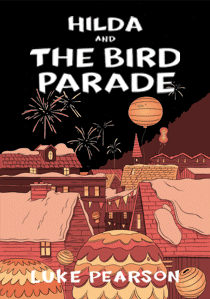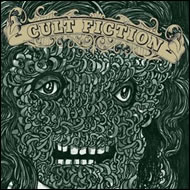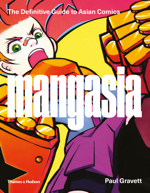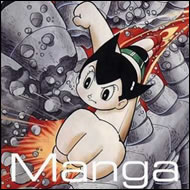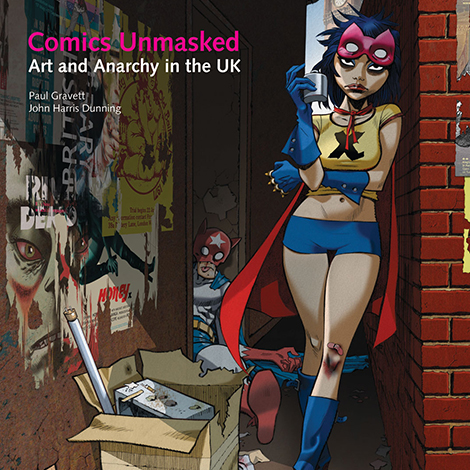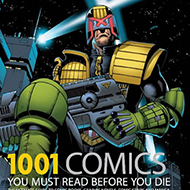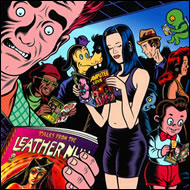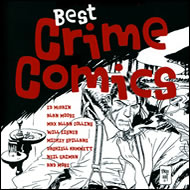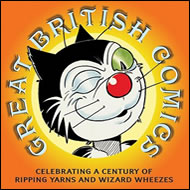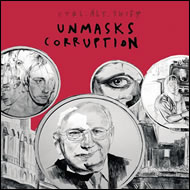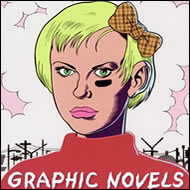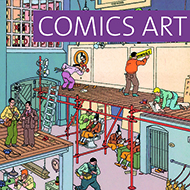Paul Rainey:
There's No Time Like The Present

Today, November 28th, Paul Rainey won the 2020 Observer / Jonathan Cape / Graphic Short Story Prize. You read it online here. This seemed like a good time to re-present the extensive interview which Paul gave me when his epic graphic novel, There’s No Time Like The Present was co-published by Peter Stanbury and me as our second hardcover title from Escape Books.
Paul Gravett: I’ve realised that I really got into comics more deeply through seeing their TV versions first - Thunderbirds in TV21, Hergé‘s Tintin cartoons, the Batman TV show. Was it Planet of the Apes on the telly that got you to buy the PotA comic - and how did it change your life?
Paul Rainey:
Yes, it was! I loved the Planet Of The Apes TV show when I was a kid. I remember that it used to be on ITV on Sunday nights. Technically, Sunday is a school night, and my bedtime was supposed to be at eight o’clock. I loved Planet Of The Apes so much that my parents, who were normally inflexible about such things, allowed me to stay up until 8:15 so I could watch the whole episode. Anyway, one day, during children’s TV, I saw an advert for the new Planet Of The Apes comic and bought a copy a couple of weeks later. I loved it! Planet Of The Apes was a Marvel comic and, as everyone knows these days, Marvel are very good at making you engage with their other product. Planet Of The Apes might have been a licensed comic but it ran these editorials which would say things like, “if you like Planet Of The Apes, then you will LOVE Spider-Man Comics Weekly!” I remember making my way through their entire line but liking particularly The Mighty World Of Marvel Featuring The Incredible Hulk or, as me and my friends called it, “Marvel Hulk”.
What was your family background and childhood like? Any cartoonists in the family?
I’m the eldest of six children. Unsurprisingly, we’re Roman Catholics. In my formative years, my Dad was an electrician but when I was around nine years old, due to illness, he switched careers and became a salesman of double glazing, stone cladding and cavity wall isolation. I’ve never understood why he gave up a reliable wage for the unreliability of self-employment to, apparently, reduce his work stress. Anyway, when I used to walk into the house with a pile of new comics, he would tell me that his Dad’s nickname for him was ‘Comic Cuts’ because he always had his head in a comic when he was a kid. As far as I’m aware, he never made any, only read them.
What was Milton Keynes like when you were young? Was it like living in the city of the future?
No, it was like walking around a big muddy field with occasional pockets of densely populated, new council estates. I remember as a lazy teenager being frequently woken up by the sound of diggers. I moved here over thirty years ago and it’s obviously grown a lot in that time. I used to imagine that as an old man in Milton Keynes, I would be able to say to young people, “I remember when all this was fields” and it’s come true!
What part did reading comics play in your growing up - were they a solitary guilty secret or shared communal fun with friends?
I’ve been thinking a little about this recently. I’ve often thought that I was obsessed with comics when I was growing up but, these days, thanks to the internet, I have daily access to something new about comics almost constantly. As a child, before the internet, or before it came into common usage, it would be days, sometimes weeks, at a time without a new comic to read. Having said that, I loved TV and I loved pop music but I loved comics more.
I was always OUT about my enthusiasm for comics, which some of my friends weren’t. In my early teens, I started buying fanzines and often they seemed to be put together by older boys, who would say stuff like they had stopped reading comics during their teens because they had discovered girls, before rediscovering comics again during their early twenties. It was as if girls were just a phase for them, whereas comics were the real thing. How strange.
Were drawing and storytelling always important to you as a boy and if so, how did you develop your skills at them?
Yes, both were, although I was one of those kids who had at least two other kids in his class who were better at whatever it was than him. My spelling was, and is, appalling and that just seemed to unbalance the perception teachers had of my writing ability. As an adult, I’m obsessed with making sure that the writing is as good as I can make it. The great thing about both writing and drawing now is that I feel that I continue to improve.
When did you make your first comic? Did you make your own magazines or story books? Did you keep them to yourself or show them to family, teachers or classmates?
I remember working hard on a strip called The Three Captains when I was around nine years old. In it, Captain Marvel, Captain America and Captain Britain teamed up with each other, probably after having a fight. I showed it to a teacher who later told my parents that I was obsessed with superhero comics, which probably explained my poor spelling, and that I should be discouraged from reading them. My parents came home from that parents’ evening and informed me that I wasn’t allowed to read superhero comics anymore, which is the worst thing that that teacher ever did to me; much worse than those occasions when she sadistically shut my fingers in my desk, for example. (Catholic school).
Who were your formative influences from comics? Was the British Beano tradition or 2000 AD part of them, or were you more affected by American Marvel/DC comics?
Initially it was Silver Age Marvel Comics. I loved, and continue to love, Jack Kirby and Steve Ditko. Later I fell in love with 2000 AD (in spite of that teacher, not because of her). I feel I have definitely been influenced by John Wagner and Mike McMahon. From an early age, I’ve been fascinated by comics and, I suppose, have always de constructed them to some degree.
Were you good at art and English in school? What were your best subjects? Were you into playing sports?
I always enjoyed English Language at school but was constantly being graded at a ‘C’ because, I presume, of my poor spelling. My best subjects were Art and Maths. I wasn’t that bothered about competitive sports mainly because I was worried about accidentally breaking my glasses but I played football in the street occasionally (I was pretty good in goal).
What were the other pop culture crazes that hooked you - in TV, music, films, etc and what did you get out of them?
I loved TV when I was growing up and still do. Often, when somebody wanted to know what was on that night, instead of looking in the paper, they would ask me. This was great because it meant that I had a subtle influence over what we would watch. I liked anything that I thought was funny, American adventure shows, cartoons, day-time TV and British soap operas.
I’ve been into music since I was around twelve. I’ve always had a soft spot for a good new indy band and a remix. I spent my teenage years listening to night-time Radio 1 as I drew comics, making a note of the tracks I liked to seek out in the Woolworth’s bargain bin later. I still listen to my favourite radio shows doing exactly the same thing except, these days, finding the tracks I like is much more easy.
How did you get round that parental ban on reading superhero comics? Were you allowed to read British titles like 2000 AD?
I should have mentioned, I was allowed to still read comics, just not American comics. This ban was a year or two before 2000 AD started. I remember giving The Beano a go and not being that impressed by it. I quite liked Look-In but one week, David Soul was on the cover and all the copies in Hatfield (where I lived before moving to Milton Keynes) sold out. I decided that its availability wasn’t reliable enough and so stopped buying it. I remember buying the first issues of Action and really enjoying that. The free gift in issue one was an iron-on transfer of their Jaws-a-like character, Hookjaw. My mum ironed it onto a T-shirt which, I remember making last for years. Another comic I really liked was Tarzan Weekly. I later learned that I had accidentally broken my parents’ ban as it apparently reprinted material from American comics. Anyway, two months into the ban, I had a massive temper tantrum and to my utter surprise (they never usually worked to my advantage) my parents gave in.
Did you show or share your own self-created comics with friends or classmates and did you keep them secret? What feedback did you get?
I don’t recall hiding my comics or sharing them either. I think everyone knew I drew them but I always assumed that they weren’t interested.
Dave Gibbons watched his comic books go up in flames when they were confiscated at his school. Years later, he went back as the co-creator of Watchmen and addressed the students about comics. I wonder what you’d think at some stage of giving a talk by you at your old school to pupils about comics.
Unlike my secondary schools, the junior school that had the sadistic teacher working is still open. Even if I were to reach the level of success that Dave Gibbons has achieved, I find it hard to believe that they would remember me.
Tell me about how your Fly Guy strip came about.
During my teens I drew a strip called Fly Guy for The Milton Keynes Mirror which was a free paper we had delivered every Sunday. They started running a bland, syndicated strip in it about a bird or something but readers took this as an invitation to send their own comic strips into the paper. For a time, an entire tabloid page was filled with strips sent in by Milton Keynes residents. In the end only Fly Guy and Tin Tac by John Welding were left standing. After a year or so, I learned that the Mirror was paying John for his cartoons but they weren’t paying me. After they ignored my polite request for them to cover my expenses (know what I mean?) I decided to end the strip by dropping a nuclear bomb on the characters.
Can you tell me a bit about what you did after you left school? What were career ambitions?
I always wanted to be a comic creator so my work life has always been disappointing to me. I left school aged seventeen and did a series of temp jobs for a few years. When I was nineteen, I worked in the Abbey National’s Computer Operations department for a year. After that, I managed a comic shop in Central Milton Keynes for four years. Then, after that, I was re-employed by the Abbey National despite the dubious circumstances under which my previous employment with them had ended. The Computer Operations department had grown and the Abbey had opened a new building dedicated to it. I ended up working there for another sixteen years.
If Planet of the Apes was your first wake-up call, what inspired you to self-publish your own comics? How did you first discover the small press scene? Who were some of your contemporaries and peers who you met and felt affinities with?
My friend Andrew Mannion and me used an exercise book stolen from school to create a comic when we were twelve years old. The idea was that I would write and draw the lead strip then hand the book over to him to draw the second, after which he would hand it back and I would draw the third. Although Andy was in a higher group for English than me, people were always telling me how good at art I was supposed to be, so I was very confident that when our mutual friends saw the finished product, that they would all agree that my strips were the best. Anyway, when Andy handed the book back for me to draw the third strip I could see that he was a better artist as well as a better writer and I lost my motivation.
When I first moved to Milton Keynes, Robert Patrick and I made a comic called Clone. Robert knew the man in charge of the school photocopier personally and persuaded him to run off ten copies each for us. I remember seeing my artwork being pumped out of one end of the machine and finding that very exciting. Soon after leaving school, I made friends with some guys who were putting together a magazine about the local music scene called The Spot. I was asked to draw some strips for it so I drew some sub-Viz stuff like ‘Greg Heath The Compulsive Thief’. I was their ‘cartoon editor’ which meant that I drew the comics strips, basically. I also sat behind a table at gigs trying to sell them while the editor went inside to watch the bands. Although I read comic fanzines like Fantasy Advertiser and subscribed to Escape, I didn’t involve myself in the scene. I think I always felt intimidated by it.
Did you go to comics conventions? What were you experiences of them? Did you get any advice or encouragement from meeting favourite creators there?
Andrew Mannion and I used to attend UKCAC together. I thought UKCAC was great. I remember loving the panels. I always went to the 2000 AD panels. I was at the Watchmen panel at which Alan Moore got mobbed. (I wasn’t one of the mobbers. In fact, I remember feeling very disapproving of the mobbing). I always tried to attend the Escape panels (usually in the smaller room). I remember having my mind blown the first time I saw Eddie Campbell; this was a real life comic character walking into the room! The more I liked a comic creator, the less likely I was to interact with them because I felt that my interactions were usually disastrous. I once stopped Grant Morrison to ask him something and couldn’t pay attention to his answer because he was wearing sunglasses indoors. I mean, really!
Did you contribute to any small press anthologies to get your work seen? Did you send your samples in to say UK Marvel or 2000 AD?
I started sending unsolicited scripts to 2000 AD when I was about sixteen. The first rejection I got was very encouraging. The second, not so. The third simply said, “poor plot, poor dialogue, poor twist.” This Future Shock story featured a man being driven to violence because he couldn’t escape the constant inane chatter of a radio DJ. About six months after receiving the rejection, 2000 AD printed a John Wagner and Alan Grant Judge Dredd strip featuring a man driven to violence because he couldn’t escape the inane chatter of a radio DJ. Even at the time, I didn’t believe that they could have stolen my idea but, equally, I couldn’t believe that it was a coincidence either. A few years ago, when I was re-reading the first one thousand issues or so of 2000 AD for my 2000 AD Prog Slog Blog, it occurred to me that what probably happened was that the real Tharg read my solicitation, rejected it, forgot about it and then, one night, down the pub with Wagner and/or Grant, suddenly thinks he has an idea for what could make a good Judge Dredd strip. I realised that I much preferred this free exchange of ideas to happen because the Judge Dredd story was much better than my Future Shock version of the idea. Publishers that have a no-unsolicited-solicitations policy in place because they fear this type of accusation are being overly cautious in my view. The experience didn’t stop me from sending in new scripts to 2000 AD but, eventually, even the increasingly curt rejection letters stopped.
I used to send comic strips to Viz. I started soon after first reading it around 1985 and their rejection letters were always very nice. Viz treat you with respect, regardless of you not being a professional artist. Anyway, every now and then I would submit a strip and it would then be rejected and then, one day, twenty-seven years later, I received an email from them saying that they would like to print a strip I had recently sent to them called ‘The 14 Year Old Stand-Up Comedian’. I’ve had something in most issues published since.
Tell me how the six issues of Memory Man came about and your goals and hopes for it. It was in an American comic-book format and obviously superhero-inspired. What reception did you get to it? What did you learn from doing this?
I had read a lot of Dave Sim editorials in Cerebus about the virtues of self publishing and decided to get a loan and go for it. I think I worked out that I only needed to sell 5,000 copies to be able to leave my job and earn a living from it which seemed easy to me as I had managed to persuade Diamond Distributors to carry it. Unfortunately, my orders were little more than a hundred and, to make the unit price worthwhile, I needed to have at least 500 copies printed. Despite dwindling sales and haemorrhaging money, I produced six issues altogether before deciding to call it a day.
Small press people were always very supportive of Memory Man. I didn’t think of myself as being part of that scene at the time but people who liked small press comics seemed to get that I was trying to make a comic that appealed to both superhero and Dan Clowes fans. I still remember fondly the people who were encouraging from that time and they were mainly small press people.
And what inspired Love Bomb - did you plan for this one to continue beyond two issues? Did you have other comic-book follow-ups also in mind or in sketch form brewing?
The inherent flaw of the direct sales market meant that the orders for Memory Man were going to continually diminish. I realised that if I knew when I started what I know now, then I would do things differently and, one day, I thought, why not just start again? Love Bomb was an anthology of different strips of varying lengths, usually set in the same world as Memory Man but not featuring Memory Man, all drawn by me. Anyway, the ‘re-launch’ was a success of sorts as advance orders for issue one were for over 250 copies. Unfortunately, shortly after issue two came out, Diamond contacted me to say that they didn’t want to carry Love Bomb anymore because it wasn’t selling enough and that was the end of that.
I gather you got local arts grants to help you self-publish. Well done! So how did you get them, how did they help?
I think when I was doing Memory Man, a friend told me that she was on the committee that gives out grants and suggested that I apply for one. I think I got £250 to cover the printing costs of an issue. A few years later, I applied again for a grant to finance the publication of a collection of my online ‘diary’ strips, Book Of Lists. If anyone reading this is thinking of applying, then please be aware that one of the criteria is that you need to be resident in Milton Keynes.
Were you trying to get your comics published professionally? Do you have a huge collection of rejection letters? (sorry to ask!) In an alternative biography of Paul B Rainey, what would you like to have happened, what professional ‘gig’ or big-time break would have been your ideal opportunity?
Yes, I have quite a pile of rejection letters. 2000 AD, Viz, Oink, those Viz-a-like comics that were popular during the early nineties, Marvel, Deadline, The Dandy, The Beano, all the way up to more recent comics including The DFC and The Phoenix. I try not to worry about ‘ifs’ and ‘what might have beens’ too much. I think that I’m probably a better artist because of the relentless rejections I’ve had. Currently, my comics career is the best it’s ever been. I’m an occasional contributor to Viz and am currently working on something for ACES Weekly. If my career continues to improve at this rate then I calculate that I should be able to earn a living from comics in about two hundred and thirty years’ time.
How did you feel about the way the internet has transformed how people can publish comics and get them to a global readership? What did you think of the earliest experiments with webcomics, by others and your own?
I was feeling very devastated by Diamond’s decision to no longer carry my comics because, at the time, I viewed it as my only way of getting my work out there. I had felt for years that comics, for their own sake, needed to find a way of bypassing the distributor and the internet is one of the methods of doing this that has emerged. I really liked American Elf by James Kachalka and tried to replicate his model of posting something daily online when I started Book Of Lists. The internet is great and the difference between before and after its arrival on our lives is one of the influences on my graphic novel There’s No Time Like The Present.
One ongoing project was your Book of Lists, both online and in print. What motivated this?
During my wilderness years after the end of Love Bomb, I found that I was still drawing comics. Once I became aware that I could find a way of posting the strip online and that it didn’t need to conform to the format limitations of the American format, I found that very liberating. I had always wanted to have a go at a diary strip but I found that, very quickly, I drifted into self-indulgent whining. When I was at the Abbey National, I worked with a woman called Alison. It amused me to keep a list of all the mean things that she said to me and, one day, once it had become quite substantial, I read the list out to Alison and my work colleagues in an unemotional voice. Everybody seemed to find it funny and it struck me that the voice and the disciplines I was using might be good methods by which to draw a diary strip with.
You chronicled your daily life and observations in diary comics - what were the challenges and rewards of making autobio comics?
I found the strip constantly rewarding. Friends, family and work colleagues, people who didn’t usually read comics, always responded very positively to it. I was very pleased with the boundaries that I had imposed upon myself and felt happy working within them. I had also got the balance right between the rate at which I wanted to produce the strip, its reliability and the rest of my life.
The challenges were making people aware that it existed. The visit-stats to my website during that period were a steady and satisfying climb. I also didn’t want people I knew to worry about being on the receiving end of a venting in Book of Lists, if they said or did something that might upset me in my daily life. I tried to make sure that, usually, I was the butt of the ‘joke’.

OK, so what was the initial spark that triggered There’s No Time Like The Present? When and how did you start it?
It was a combination of ideas for strips that I hadn’t found the time to draw. I had the idea for a sit-com I had called Geekwa about a group of Geeks/cult media fans who would meet every fortnight to talk about Star Trek and the like and I had created a bunch of characters for that. I also wanted to do a time travel story that avoided the clichés that one might normally encounter in time travel stories, like for example, if you’re careless in the past, then you might wipe yourself from existence. I had managed to agree a year long career break from the Abbey National which I intended to use to create a more substantial, novel-length piece of work. Funnily enough, my original intention was to work on something else entirely, but when I actually got started on the work, I found myself more enthused by what became TNTLTP.
The story opens with a reference to Diamond Previews, the thick monthly catalogue giving comic shop customers the chance to order their choice of title two months in advance. Was this one influence for the idea of having access to pop culture from the future?
Not really. The idea for the ultranet (where characters can download movies and music from the future) was my attempt to acknowledge that a seemingly impossible thing, the internet, had occurred during my lifetime. When I was a teenager, it was impossible to imagine something like the internet existing and yet, over ten years later, there it was. I can now access movie trailers and pop videos and old school friends that I’ve lost contact with with relative ease. Amazing!
Did the whole story come to you, did you know the ending, or where you were heading with it from the start? Did you have any idea how long it would run for, and the time you’d need to complete it?
When I started the strip, I knew how it ended and I also knew the points throughout the story that I was trying to navigate to. However, I was totally aware that it would take me a long time to complete and so I allowed myself a lot of wriggle room to be spontaneous and to prevent myself from getting bored by my familiarity with it.
What appeals or disappoints visitors from the future when they come to our present day? Are they harking back too to an earlier, simpler time?
In my story, time travellers can only go as far back in time as the point at which time travel is invented. This means that there is a whole history that, despite this incredible discovery, the future still can’t get access to. My view was that the future is a very, very, very long time and that there would be plenty of people wanting to book up all the transmissions to as far back into the past that they are able to reach. Because these people would also want to return home after their visit, this meant that are no places available for the indigenous population of those eras to travel into the future from.
What science fiction authors have influenced you and in what ways? And any in particular on TNTLTP? Andy Oliver from Broken Frontier suggested a hint of Kurt Vonnegut’s Slaughterhouse Five?
I haven’t read any Kurt Vonnegut. Perhaps I should. I went through a big Philip K. Dick phase shortly before starting work on TNTLTP. I thought, if I can create something with the imagination and emotional impact of Valis, then I would be happy.
There’s a pointed quote in There’s No Time Like The Present: “You youngstahs… you give the past y’cant reach such mystique.” What was your thinking behind this? Do you do this yourself?
I often think that the secret to improvement is to move on from the past and to be excited about the future. I think that when Hugh said this line in the story, he’s expressing his bafflement that somebody who has the whole future to run around in would want to hang around with a bunch of old geezers in a present that he finds tedious and uneventful. Also, I imagine if you can travel to anywhere in time except to before sixty years ago, that any era prior to then would seem mysterious and intriguing.
Do you think such harking back and nostalgia can distract from moving forward and moving on in your life? Or is it a welcome comfort and consolation in these uncertain, accelerating times of change?
I think that culturally, we dwell in the past a bit too much, but I also recognise it in myself a bit too. Most of the big movies these days, for example, rely upon those of a certain age being able to connect it with something from their past. Old ideas being constantly regurgitated. For example, there have been Batman comics in the past that I’ve enjoyed, but is he really so great a creation that he can support seventy-five years worth of stories? I don’t think so.
It’s weird, I have lots of stuff from my childhood - Kirby’s Marvel, Thunderbirds, Batman on TV - that I do treasure but I don’t feel any loyalty towards them? I am not ‘invested’ into any ongoing franchise at all. Do you religiously follow the new Planet of the Apes movies for example?
Sometimes, I think that I am like you and then sometimes I worry that I’m not. For example, I could have quite happily lived my life without ever having seen a new Planet Of The Apes film, but then they go and make a new one that I see and enjoy anyway. I didn’t used to believe in ‘guilty pleasures’ but I find that my enjoyment of the Marvel Studio films defies my reasoning that I can only think to describe them as a guilty pleasure. I know that one of the reasons I enjoy them so much is that I am making connections with comics I read and loved when I was a kid. My rational mind would much rather watch new movies with new ideas about new things, but I can’t help myself!

Someone has to ask you about Doctor Who, sorry. Do you have one Doctor who is special to you? What does the character and concept mean to you? What are your thoughts on time travel and its paradoxes?
I could take or leave Doctor Who when I was growing up. I remember Madness reviewing that year’s new annuals in the NME one Christmas during the eighties and they described Doctor Who as a wanker which I thought was very funny. The character of Cliff in my story is inspired by a visitor to the comic shop that I worked in who loved Doctor Who. The show was cancelled by this point and I couldn’t understand why somebody who seemed funny and intelligent was still obsessed by something that was no longer being made. When I started work on TNTLTP, the TV show hadn’t returned (that’s how long the book has taken to complete). As it happens, I really enjoy the modern incarnation. I think it’s one of the best dramas on TV. By the way, my doctor is the Dave Gibbons version from Doctor Who Weekly, 1979. You cannot fully appreciate Doctor Who until you’ve experienced it in the original comics.
Did the serialised format force you to edit the story to fit the page count, or try to set up cliffhangers?
No, I deliberately meant for it to be one long story. I would write and draw a scene at a time and then, when I had finished twenty-four pages or so, would self publish it as a comic. If it has an episodic feel then it is purely my subconscious exerting itself.
Was TNTLTP your first proper attempt at a lengthier ‘graphic novel’? How was it making the transition to this ambitious, longer-form format? What are your views on this troublesome term, this re-branding, that has become more-or-less accepted these days?
I used to say that TNTLTP was my attempt at a graphic novel or long comic strip. The term ‘graphic novel’ carries with it associations with depth and intelligence and creativity that I think I might have felt intimidated by. (I shouldn’t have felt intimated as most published novels probably don’t have those qualities anyway). I’m quite happy with ‘graphic novel’ or ‘comic’. They’re both appropriate to my mind. Comic does carry with it associations with pop and supposed disposability that I like, however…
Did you base any of the characters on yourself, or friends or acquaintances? And your own experiences? Has anyone recognised themselves?
As I say, Cliff was inspired by a guy I used to know called Ford, although he had evolved into quite a different personality by the time I started on the strip. In general, the characters are seemingly conjured from thin air but are probably amalgamations of different people I know or have encountered. I usually try to inject something I have experienced or witnessed in real life into a scene to try and make it feel truthful, even if what’s happening, what the characters are saying and doing, are things that I haven’t experienced before.
What soap operas have you followed? Do you follow any still? What makes them compelling? Do they risk becoming a substitute for reality?
I grew up watching Coronation Street and still watch it today but in my time I’ve dabbled in EastEnders, Brookside, Neighbours and even Family Affairs, Channel 5’s short lived soap. I remember an American guest on Terry Wogan’s chat show saying that he had watched Coronation Street for the first time and couldn’t understand why it was so popular in our country, as nothing seemed to happen in it. Even as a youngster I thought to myself, well, that’s the point. Storylines about murder and affairs pretty much dominate modern soaps unfortunately, but there still occur fantastic tales of ordinariness that run in their wake that make them worthwhile.
How much of the real new town of Milton Keynes influences TNTLTP? What is your relationship to your hometown, living in an architect’s dream of futuristic, car-orientated urban planning?
I’ve lived in Milton Keynes for over thirty years so I have a lot of friends and family who live here or near to here. Why I set the book here is because of all the places that there are in the world, Milton Keynes is the one I know the best.
Can you take us through your creative process on an episode of TNTLTP? Were you keeping sketchbooks to plan out your scripts, dialogues and layouts? Were any deleted scenes left on the cutting-room floor? Could we even see step-by-step how a page comes together maybe?
I wrote and drew a scene at a time. Initially, I would write it as a prose piece, then I would rewrite it with thumbnails, then I planned the page which meant that I rewrote it again and then I drew it, rewriting it again. I drew half a page on a sheet of A4 paper. Initially, I drew the strip on 80 gsm photocopy paper, tracing and inking over roughs I had drawn on other sheets. Later, I drew it onto sketchpad sheets of A4. The artwork was scanned and assembled using Photoshop. I still have the original artwork but I threw away all the workings-out.
Some scenes took more re-writing to make work than others. For example, the early scene where Barry and Cliff are waiting for a lift outside the comic shop was initially very different in its early drafts. But I don’t recall there being any scenes that were dropped altogether. I had the frame of the story inside my head from the start. As I say, I allowed myself a lot of wriggle room.
Your conception of the ‘Ubiquiverse’ suggests a radically different perspective on our pasts, presents and futures. Without giving anything away, can you discuss this a bit? (or not?)
I needed something to explain the paradoxes of time travel. For example, if you hear a song from the future and then write that song, where did it actually come from? I didn’t want alternative universes coming into being to cover all possible decisions the characters might face in the story. Your life is ‘predetermined’. Get used to it!
As an author and artist, how important is self-belief? And self-doubt? How much easier would life be if you simply worked and consumed rather than trying to create and express something?
I was thinking the same thing recently. If I didn’t know that I wanted to make comics as an adult for a living when I was a child, would I have been more accepting of things and more successful in the workplace? I have this uncomfortable conflict between arrogance and low self-esteem. I believe utterly in whatever it is that I am working on creatively at the time but am always bemused when I come up for air that it’s not more popular than it is.
Tell me about your campaign to get published in Viz - not an easy title to break into for anyone, to be honest. What were some of the brilliant ideas they rejected? And can you run through the series they are printing (when did your first Viz strip appear)? Do they edit you at all?
As I explained earlier, it took me around twenty-seven years to get into Viz. I should point out that I wasn’t constantly sending them strips but I would probably send them something once or twice a year. ‘Greg Heath The Compulsive Thief’ was definitely sent to Viz. Some of the strips from Love Bomb like ‘The Flask Shop’, for example. I stopped gearing strips specifically for them long ago. Whatever I had drawn that seemed funny to me might be sent to them for consideration. I was going to send the ‘14 Year Old Stand-Up Comedian’ to The Phoenix but sent to Viz first, because I didn’t have the time to colour it in.
Have you written for other artists? Does this interest you to do more?
I really enjoy working with other artists as the end results are nearly always better than I initially expect. I’ve written a couple of strips, Body Pop and Connected, for my friend Robert Wells to draw in recent years and they have both looked great. Rob’s a great writer himself (I use him as my proof reader. Everything I do needs Rob approval before it goes elsewhere) and he’s currently working on his own graphic novel, so I don’t imagine he will have the time to draw anything else of mine anytime soon. I have a very personal script called Injury Time with Peet Clack, waiting for him to draw it. I know that that will look really good when it is finished.
What are you other recent and current projects? Did you envisage Thunder Brothers Soap Division as another magnum opus, and will you return to it?
After spending over seven years working on TNTLTP, I thought I would work on something quite different and even more ambitious and that was Thunder Brother: Soap Division. So far, I have completed over ninety pages of it but been distracted by other opportunities. I really want to get back to it and would be motivated to do so if somebody, a publisher for example, were to make me a deal.
What is next on your drawing board for your personal comics-making? Do other media like TV, music, gallery art, movies etc appeal to you as well? What other creative ambitions do you harbour for the future?
Currently, I’m working on a strip for ACES Weekly called ‘PitKnack’. It started out with me wondering what Minecraft would be like in forty years time. Initially, I thought it was just going to be a two-part story, then a four-parter, then a one volume-long tale (seven episodes) and now, I’m thinking, that it might end up being longer than that. I’m basically making the story up as I go along and am really enjoying setting myself plot traps that I have to resolve later on.
Then, of course, I continue to send strips to Viz. They have a few in their slush pile and one or two waiting for approval. I haven’t had anything appear in the last couple of issues but, in general, I’ve had a very successful year with them.
I would like to put together my answer to the Nelson graphic novel. The working title is Hardy Har Har and would feature contributions from the third set of the best fifty British cartoonists (just to guarantee myself a place in it). I would love to have a go at a sitcom. I don’t have a title for it yet but the tagline is “the stupid man’s Mr Bean”. Every now and then I tweet @marvel asking if they will pay me to make a Sub-Mariner comic for them but they never reply. In it, Atlantis has become a republic and Prince Namor has to earn a living from touring America making personal appearance in shopping malls and signing seashells.

This interview originally appeared in 2014 on the former Escape Books website. Black-and-white photo © by Etienne Gilfillan.

